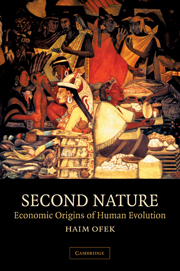Book contents
- Frontmatter
- Contents
- Acknowledgments
- 1 Introduction
- Part 1 Bioeconomics
- 2 Exchange in human and nonhuman societies
- 3 Classical economics and classical Darwinism
- 4 Evolutionary implications of division of labor
- 5 The feeding ecology
- 6 The origins of nepotistic exchange
- 7 Baboon speciation versus human specialization
- Part 2 Paleoeconomics
- References
- Index
2 - Exchange in human and nonhuman societies
Published online by Cambridge University Press: 06 July 2010
- Frontmatter
- Contents
- Acknowledgments
- 1 Introduction
- Part 1 Bioeconomics
- 2 Exchange in human and nonhuman societies
- 3 Classical economics and classical Darwinism
- 4 Evolutionary implications of division of labor
- 5 The feeding ecology
- 6 The origins of nepotistic exchange
- 7 Baboon speciation versus human specialization
- Part 2 Paleoeconomics
- References
- Index
Summary
Upton Sinclair's novel, The Jungle (1906), is a brutally graphic account of the ruthless competition in the stockyards and slaughterhouses of Chicago at the turn of the nineteenth century. Literary observers like Sinclair, and social observers in general, have often appealed to an imaginary animal-like struggle for survival in search of analogies that describe human conduct in the marketplace. The analogy is unfair to humans as much as to animals. In reality, the essential pattern of market activities, perhaps more than any other pattern of human behavior, is marked by the lack of analogy with animals.
Exchange, or apparent exchange, among living organisms other than humans is largely confined to the realms of symbiosis and nepotism (i.e., transfers among members of separate species and transfers among related conspecifics, respectively). For human beings these two patterns of exchange are only part of a wider repertoire that includes a remarkable addition in the form of mercantile exchange (transfers among conspecifics at large). A preliminary survey of these three patterns of exchange will be given in this chapter.
Adam Smith's zoological digression
Adam Smith was a younger contemporary and, it is told, a great admirer of Linnaeus (Schabas, 1994:332). The Linnaean version of the “economy of nature” had already acquired some enthusiastic following among English-speaking readers like Erasmus Darwin, another contemporary of Linnaeus (and grandfather of Charles), who cast the Linnaean system into verse under the title The Botanic Garden (1789). Smith's main concern, however, was the man-made “political economy.”
- Type
- Chapter
- Information
- Second NatureEconomic Origins of Human Evolution, pp. 9 - 25Publisher: Cambridge University PressPrint publication year: 2001

